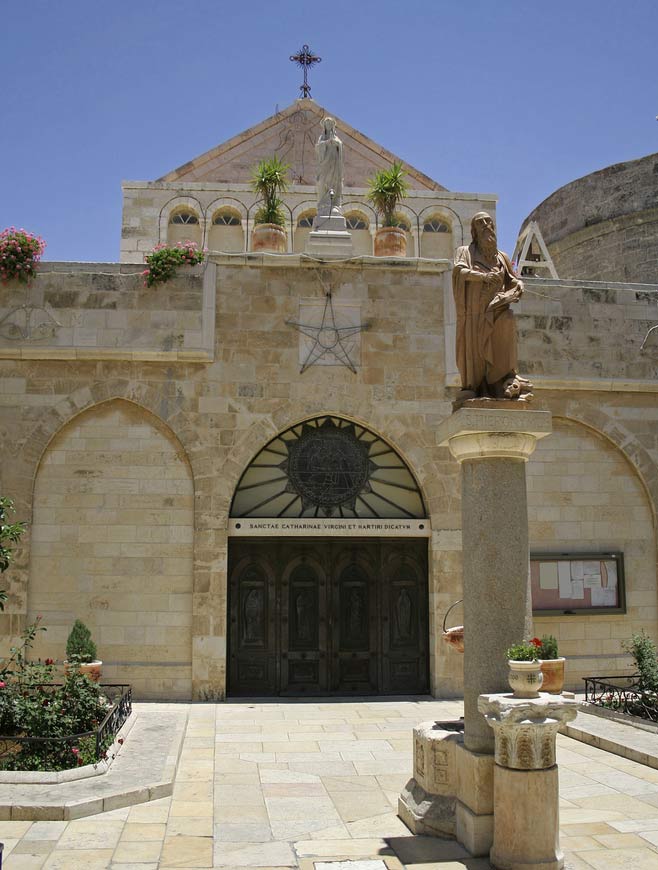Birthplace of Jesus Listed by UN as World Heritage Site

Get the world’s most fascinating discoveries delivered straight to your inbox.
You are now subscribed
Your newsletter sign-up was successful
Want to add more newsletters?

Delivered Daily
Daily Newsletter
Sign up for the latest discoveries, groundbreaking research and fascinating breakthroughs that impact you and the wider world direct to your inbox.

Once a week
Life's Little Mysteries
Feed your curiosity with an exclusive mystery every week, solved with science and delivered direct to your inbox before it's seen anywhere else.

Once a week
How It Works
Sign up to our free science & technology newsletter for your weekly fix of fascinating articles, quick quizzes, amazing images, and more

Delivered daily
Space.com Newsletter
Breaking space news, the latest updates on rocket launches, skywatching events and more!

Once a month
Watch This Space
Sign up to our monthly entertainment newsletter to keep up with all our coverage of the latest sci-fi and space movies, tv shows, games and books.

Once a week
Night Sky This Week
Discover this week's must-see night sky events, moon phases, and stunning astrophotos. Sign up for our skywatching newsletter and explore the universe with us!
Join the club
Get full access to premium articles, exclusive features and a growing list of member rewards.
The Church of the Nativity, considered by Christians the birthplace of Jesus, has been accepted as a cultural World Heritage Site, becoming the first such site in the Palestinian territories.
The announcement has garnered plenty of kudos from Palestinians online, though Israel and the United States reportedly lobbied hard against its inscription into the World Heritage List.
The church, and the Pilgrimage Route, reside in an Israeli-occupied part of the West Bank that's administered by the Palestinians. Located in the holy city of Bethlehem, the Church of the Nativity, a Byzantine basilica, is built on top of the cave where, according to a tradition first documented in the second century, Jesus was born, according to the United Nations Educational, Scientific and Cultural Organization (UNESCO).
Controversial vote
The vote took place in St. Petersburg, Russia, as part of the 36th yearly session of the World Heritage Committee, consisting of representatives from 21 of the States Parties to the Convention. They considered 36 possible World Heritage sites, with the last site — Lena Pillars Nature Park of the Russian Federation — announced today (July 2). A total of five natural sites and 20 cultural sites were inscribed during this year's session.
The Church of the Nativity and the Pilgrimage Route, Bethlehem, were also placed on the List of World Heritage in Danger, as the site suffers from damages due to water leaks. [Photos of the Church of the Nativity]
Palestine, which became a member of UNESCO in October 2011, presented the church and the surrounding route used for religious pilgrimages as its first site for inscription on the World Heritage List.
Get the world’s most fascinating discoveries delivered straight to your inbox.
The vote to accept the Palestinians into UNESCO also proved controversial, according to a CNN news report, suggesting the United States held the view that a peace deal should be reached with Israel before the Palestinian territories were granted full UNESCO membership.
Becoming a UNESCO member only recently, the Palestinians decided to try to get the church on the list on an emergency basis, something that is used in instances where the site is in imminent danger. Experts on the World Heritage Committee did not think the Church of the Nativity qualified, although it is in need of renovation and conservation, according to an article in the New York Times.
Even so, the site was inscribed into the World Heritage List.
"The United States is profoundly disappointed by the decision of the World Heritage Committee to take immediate emergency action as proposed by the Palestinians to inscribe the 'Birthplace of Jesus: the Church of the Nativity and the Pilgrimage Route, Bethlehem' as a World Heritage site against the official recommendation of the International Council on Monuments and Sites, the expert advisory body that evaluated the site," David Killion, U.S. ambassador to UNESCO, said in a statement.
Church's religious history
The site does have strong religious and cultural underpinnings. Helena, mother of Christian Emperor Constantine, is said to have intended the basilica to commemorate Jesus' birth.
The church was one of three imperial churches built in Palestine under the Christian emperor. In A.D. 529, the church was destroyed and built on a much bigger scale, essentially the church that stands today.
The part of the church with the greatest religious and historical significance is arguably the Grotto of the Nativity, according to a description of the church written by Qustandi Shomali, a professor at Bethlehem University. Two entrances now lead to the grotto where an altar was erected over what Christians believe to be Jesus' birthplace and a 14-pointed star was embedded in the white marble floor to mark the spot where Jesus was born. The star bears a Latin inscription: "Hic De Virgine Maria Jesus Christus Natus" Est - 1717, translated as, "Here Jesus Christ was born to the Virgin Mary."
"The universal outstanding value of Bethlehem is unquestionable," UNESCO officials write. "It has been, and continues to be, a focus of Christian belief and worship throughout the centuries. Bethlehem, as well as Jerusalem, became the heart of the Christian world."
Chad, Congo and Palau also had World Heritage sites inscribed on the list for the first time this year.
Follow LiveScience on Twitter @livescience. We're also on Facebook & Google+.
Jeanna Bryner is managing editor of Scientific American. Previously she was editor in chief of Live Science and, prior to that, an editor at Scholastic's Science World magazine. Bryner has an English degree from Salisbury University, a master's degree in biogeochemistry and environmental sciences from the University of Maryland and a graduate science journalism degree from New York University. She has worked as a biologist in Florida, where she monitored wetlands and did field surveys for endangered species, including the gorgeous Florida Scrub Jay. She also received an ocean sciences journalism fellowship from the Woods Hole Oceanographic Institution. She is a firm believer that science is for everyone and that just about everything can be viewed through the lens of science.
 Live Science Plus
Live Science Plus










